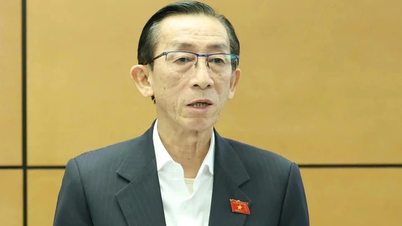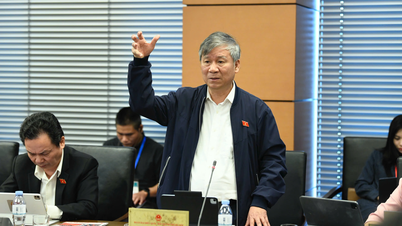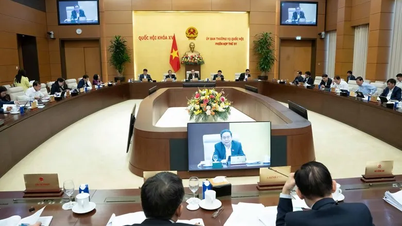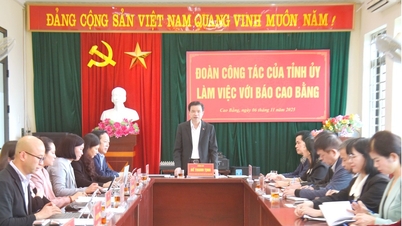
National Assembly delegate Tran Hoang Ngan supports the idea of abolishing construction permits, but requires management measures to assess the impact. Photo: Pham Dong
There are licensing regulations but people still build illegally.
On the morning of November 6, the National Assembly discussed in groups the draft Law on Construction (amended) .
Delegate Tran Hoang Ngan (Ho Chi Minh City Delegation) supports the shift from pre-inspection to post-inspection of construction projects and works, but it depends on the work.
If large projects of regional and national security importance are completed and then inspected, if any problems arise, the consequences will be serious.
According to delegate Ngan, recently many construction projects were completed but could not be put into use. Then inspections and checks were carried out, so the initial pre-inspection stage had problems. Therefore, we must pay close attention to this point of view.
Delegate Ngan gave an example: Recently, due to natural disasters and floods, many projects collapsed, most of which were constructions that did not meet construction standards.
"That building was built according to standards to withstand earthquakes of level 5 or 6, but even a slight earthquake caused it to collapse," the delegate analyzed.
Regarding the shortening of construction permits and the removal of construction permits in planned areas in the draft law, the delegate supported it, but he suggested that there should be strict inspection.
“In large cities in the process of urbanization, when there are licensing regulations, people still build illegally. Now, if we abolish the licensing of new construction, how will we manage it and need to assess the impact,” the delegate said.
Delegates proposed to immediately remove the regulation on requesting permits for minor repairs from citizens and switch to post-inspection.
"For people's houses, I think post-inspection is reasonable. Because when the house leaks, the roof is blown away, people have to fix it. But when people just dump sand, the construction inspectors come right away. So those steps make it very difficult for them," the delegate expressed his opinion.
Wrong design, no building permit then no one knows
Delegate Nguyen Thi Yen (HCMC Delegation) is concerned about the regulations on appraisal teams. According to the delegate, we have previously established many appraisal units and many consulting units. Therefore, the responsibilities of the consulting units are not clear. Similarly, the same goes for appraisal teams.
This leads to a situation where when construction works and projects do not comply with regulations and the quality of the works is not guaranteed, it is not known who is responsible.

Delegate Nguyen Thi Yen speaks. Photo: Pham Dong
Regarding licensing and exemption from licensing in changes of function, delegates said that the authority is mainly assigned to the provincial level, rarely assigned to the commune level. Meanwhile, the commune level is the main implementing level.
"Currently we are exempting people from building permits. But how? If the building is right on the street, it must be built with 3 floors.
However, if people do not research carefully and build 4 floors, who is responsible for this management? Or if the design is wrong or the regulations are wrong, who is responsible? The commune level must take responsibility for this," said the delegate.
According to the delegate, for provincial-level projects, even though the Department of Construction issues permits, the local authorities must still manage and know. Because there are projects and works that are licensed by higher authorities but the local authorities do not know anything about them. This leads to incorrect scale, incorrect design or no construction permit, and no one knows.
"When the commune came down to ask, there was no license, but that responsibility belongs to the province. Therefore, I suggest that if any project works are located in a commune or ward, that locality must be informed so that they can be responsible for managing the area," the delegate said, suggesting that there must be close coordination between levels, sectors and localities.
Source: https://laodong.vn/thoi-su/de-nghi-bo-ngay-quy-dinh-nguoi-dan-phai-xin-giay-phep-sua-chua-nha-o-1604477.ldo




![[Photo] Closing of the 14th Conference of the 13th Party Central Committee](https://vphoto.vietnam.vn/thumb/1200x675/vietnam/resource/IMAGE/2025/11/06/1762404919012_a1-bnd-5975-5183-jpg.webp)

















![Building a 'fortress' against natural disasters: [Part 2] Changing state from passive to active](https://vphoto.vietnam.vn/thumb/402x226/vietnam/resource/IMAGE/2025/11/06/1762423529917_0242-2223-160125_902.jpeg)





















































































Comment (0)